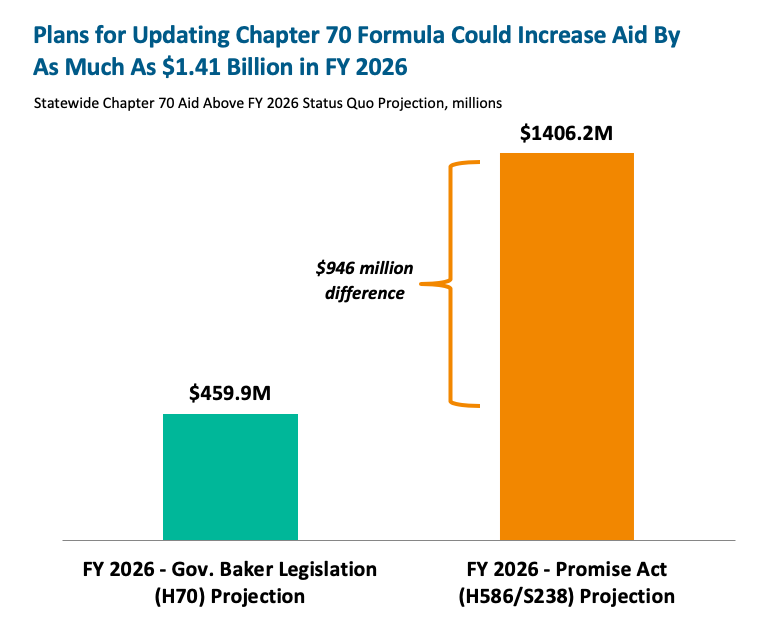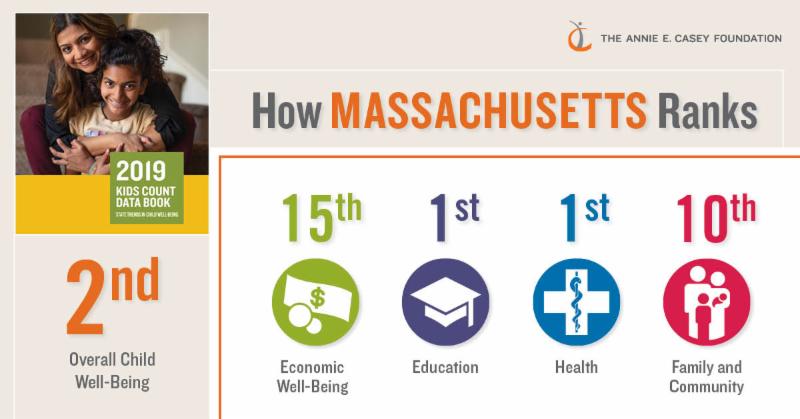Towards Equity: Massachusetts Education Funding Reform Proposals Grapple to Provide Resources to Students Most in Need
Students have the best chance of succeeding when their schools are equipped with the resources to serve them effectively. While Massachusetts is regarded as a national leader in education, we are leaving some of our students behind. The state's schools funding formula, known as Chapter 70, has not been comprehensively updated in 25 years and this has left schools, administrators, and entire districts across the Commonwealth unable to adequately support all students.
In our new report, Towards Equity: School Funding Reform in Massachusetts, the Massachusetts Budget and Policy Center (MassBudget) examines recent proposals from the Legislature and Governor Baker to update the state's education funding formula. While the current Chapter 70 funding formula helps some students reach their full potential, more statewide aid is required to make the improvements that would ensure all students are able to succeed.
"Providing high-quality public education that allows all of our students the opportunity to reach their full potential can improve both the lives of our children and the long-term vibrancy of our society," said Marie-Frances Rivera, MassBudget's President. "For public education to reach this aim in Massachusetts, it is critical that funding reforms reach every child in the state - regardless of their socioeconomic status, zip code, or race."
In the Commonwealth, wealthier communities are able to provide excellent schools through ample local tax revenue, an option not available to some of our communities who serve students with higher needs. In order for Massachusetts to truly lead the nation in education, it must move forward this once-in-a-generation opportunity to advance equity for all. The proposed reforms have the chance to close scholastic achievement gaps that particularly impact low-income students and English Language Learners (ELL).
The report contains data by district and finds that proposed changes under the most progressive reform proposal (the Promise Act) - when fully phased in after seven years - could mean as much as $1.41 billion in additional annual funding for school districts across Massachusetts. Under the more moderate proposal from Governor Baker, districts would receive $460 million extra aid in 2026. "Bringing our school funding formula into the 21st century would allow us to better serve and support students," said Senior Policy Analyst Colin Jones, lead author of the report. "With increased funding, districts across Massachusetts would have greater ability to support effective practices such as early childhood programs, wraparound social services, after school opportunities, and career-technical education. These types of approaches have increased achievement, particularly for disadvantaged kids."

2019 KIDS COUNT Data Book Highlights Need for Investments in Education, Housing, Public Programs in Massachusetts
Massachusetts has always been strongest when it has been open to newcomers. As classrooms, pediatricians' offices and homes become more diverse, the need to ensure every child has the chance to thrive - regardless of where they live or how wealthy their families are - is ever more important. That's a key takeaway as the 2019 KIDS COUNT® Data Book - the most comprehensive annual report on children's well-being - is released today by the Annie E. Casey Foundation.
"Even though Massachusetts has always been a national leader in math and reading education, half the state's children still lag behind on math and reading proficiency," said Nancy Wagman, director of KIDS COUNT in Massachusetts. "No single program or service can ensure that our kids do well - we need to support our children in all aspects of their lives, by investing in their schools, affordable housing, libraries and programs to help their parents get good jobs. Data indicates that the child population has grown more diverse- and a wealthy state like ours can do more to invest in equitable public education for our children."
According to the Data Book, Massachusetts leads the nation in health measures, reading levels and mathematic achievement, but the share of children living in poverty is the same as it was in 2010 - 14 percent. Within each domain, Massachusetts ranks:
- 15th in economic well-being. Massachusetts has fallen four places from last year's ranking in this dimension.The share of Massachusetts children whose parents lack full-time, year-round employment decreased by 10 percent since 2010.
- First in education. Massachusetts children remain first in mathematic achievement (with 50 percent of eighth-graders scoring at or above proficient level) and reading level (with 51 percent of fourth-graders scoring at or above proficient level). The percent of 3- and 4-year-olds attending school has stayed essentially the same since 2009-2011.
- First in health. The state remains first in the nation in ensuring children have health insurance, but the number of children without health insurance rose slightly between 2016 and 2017.
- 10th in family and community domain. Massachusetts' rank slipped one place since last year's ranking in this dimension, which includes children living in high-poverty areas and teen birth rates.
| 





